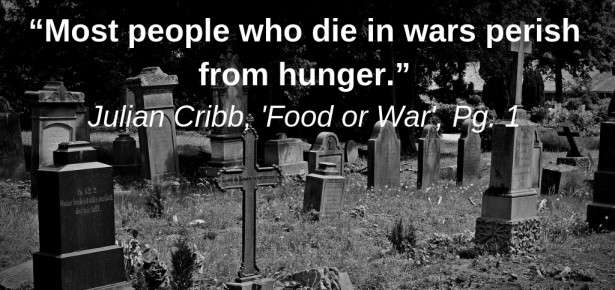
Rising tensions over scarcities of food, land and water combined with increasingly unstable climates threaten to unleash new wars and the mass flight of hundreds of millions of people by the mid-century.
‘Food or War’ identifies the nine regions globally most at risk of conflict over dwindling food resources, water especially.
“Media and political descriptions of modern wars often overlook the fact that a majority of modern conflicts are driven by scarcity of the resources need to produce food – and the fear, anger and hatred this generates between different political, religious or ethnic factions,”
“However, by securing the food supply through advanced methods such as regenerative farming, aquaculture and urban food production, we can ease the tensions that lead to war. Food is now our most powerful ‘weapon of peace’.”
I cite the case of South Asia, where a rapidly emerging scarcity of fresh water, combined with land losses and climate instability are exacerbating the risk of conflict between the nuclear-armed states of India and Pakistan.
“Even a small nuclear war, involving 100 or so weapons, could wreak havoc with food supplies worldwide. Scientific models show that the smoke and dust emitted would drive down world temperatures by 1-2 degrees causing harvest failures round the globe for 10-20 years. This could temporarily halve food availability worldwide right when humanity is attempting to double it.”
Emerging water scarcity on the North China Plain, the heartland of the country’s wheat production, could drive China to outsource far more of its food from overseas, especially from Africa, Asia and Australasia. In some cases, the need to feed China may thus conflict with the need to feed local people.
The Middle East and North African (MENA) region faces one of the world’s worst water crises, with its rich countries – where population is redoubling – also attempting to feed themselves by taking up farmland in Africa and elsewhere, adding to local instability. A major food, land and water crisis in North Africa, driven by hunger in the sub-Saharan region and foreign food exports, could have consequences for southern Europe and the stability of the entire European Community many times larger than the Syrian conflict, the book warns.
Many countries across Africa remain on a knife-edge over food, land and water security, compounded by climate impacts and desertification. This has already manifested in more than a dozen food-related conflicts in recent decades, Food or War documents.
Central Asia is another region where rising population is combining with dwindling water availability and land degradation to increase the risk of conflict.
“The good news is that all of these conflicts can be averted, by the world investing a small part of its $1.8 trillion armaments budget in novel food systems that are climate-proof and are less dependent on soil, water, artificial fertilisers or pesticides.
“That would make food the world’s greatest ‘weapon of peace’ in the 21st Century. We need to recognise that the old paradigms of food production and defence which applied in the 20th Century will not succeed in the 21st. We need a food revolution capable of meeting the new challenges of our age.
Food or War describes a food system capable of feeding, reliably, healthily and peaceably, a global population of ten billion on a hot, resource depleted Planet.
Comments Emeritus Professor Paul Ehrlich of Stanford University: “Anyone with an interest in either the human future or in food should read this clear, authoritative, scary book. So should all first-year College classes.”
Adds Canadian ecologist Dr David Suzuki “This book is an urgent call for recognition that the inescapable need for change also brings enormous opportunities.”
“This thoughtful plan to deal with an impending global food security disaster deserves coordinated and urgent consideration by the UN FAO and all national governments,” says Major General Michael Jeffery, a former Governor-General of Australia.
Latest Comments
Have your say!